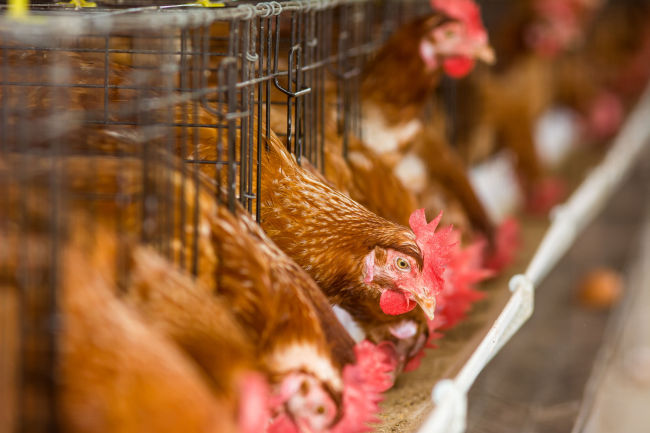Factory farming blamed for massive bird flu outbreak: experts
By KH디지털2Published : Jan. 5, 2017 - 15:27
Two months into the outbreak of a highly pathogenic H5N6 strain of bird flu in the country, experts said that poor breeding conditions at poultry farms such as industrial-scale farming of egg-laying hens may have accelerated the spread of avian influenza virus.
A record number of 30.4 million birds have been culled throughout the nation so far as of Wednesday, with egg-haying hens accounting for over 73 percent.
While the government has yet to offer clear reason for the worsening situation, casting the blame on migratory birds, experts pointed out that the battery cage-facilities at poultry farms and stockbreeding farmhouses have scaled up the damage.
These cages, rows and columns of identical cages connected together like cells, can house millions of birds. Hens spend their entire lives in a sheet of A4 paper-sized cage with dust, ammonia gas and stink.
A record number of 30.4 million birds have been culled throughout the nation so far as of Wednesday, with egg-haying hens accounting for over 73 percent.
While the government has yet to offer clear reason for the worsening situation, casting the blame on migratory birds, experts pointed out that the battery cage-facilities at poultry farms and stockbreeding farmhouses have scaled up the damage.
These cages, rows and columns of identical cages connected together like cells, can house millions of birds. Hens spend their entire lives in a sheet of A4 paper-sized cage with dust, ammonia gas and stink.

Experts and animal rights activists have been demanding the authorities come up with regulatory improvements in Korea’s overall poultry farming systems and upgrade quarantine measures.
Professor Kim Jae-hong of Seoul National University’s College of Veterinary Medicine said that “it would be strange if the virus does not spread in such a filthy environment. Damages (from the recent AI outbreak) could have been minimized if there was an upgrade in farming systems that provides a healthy environment for poultry breeding, thinking animal health and welfare.”
Experts said that breeding chickens in spacious environment, instead of cramped battery cages, can help preventing the spread of the virus, as well as strengthening veterinary surveillance.
In other developed countries like Europe, where most of stockbreeding farms have abandoned conventional battery cages for animal welfare reasons, have seen low percentage of bird flu outbreaks.
In 2012, the European Union Council banned the use of battery cages after scientists observed signs of extremely abnormal behaviors in caged hens. The number of eggs produced in battery cage-facilities in the EU has rapidly decreased since then.
Within a recent decade, UK showed a total of three confirmed bird flu cases, Germany with 8 cases and Sweden with one case.
“As long as the stockbreeding farms stick to mass breeding of egg-laying hens system, no quarantine measure will work,” said Park Choi-kyu, a professor of veterinary science at Kyungbuk National University.
“The government should recheck quarantine capacity of poultry farms in the country and introduce stricter quarantine measures to prevent another massive epidemic,” he added.
By Kim Da-sol (ddd@heraldcorp.com)


















![[Today’s K-pop] Treasure to publish magazine for debut anniversary](http://res.heraldm.com/phpwas/restmb_idxmake.php?idx=642&simg=/content/image/2024/07/26/20240726050551_0.jpg&u=)